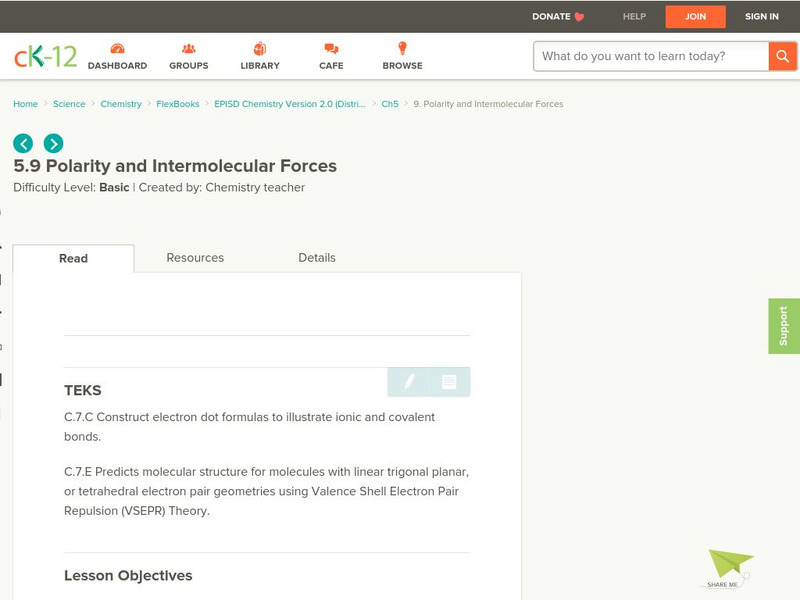Curated OER
Tile Patterns II: Hexagons
After learning that the sum of interior angles for triangles is 108 degrees, take it further to show that the sum of angles in any polygon is the same! Using hexagons, pupils practice finding the measure of the six congruent angles. Make...
Curated OER
Chemistry 151 - Final Review
In this chemistry review worksheet, students give atomic symbols for given atoms, calculate moles, determine empirical formulas, and balance chemical equations. This worksheet has 1 drawing, 9 fill in the blank, and 12 word problems.
Curated OER
Pauli's Magical Water
Students predict the shape of molecules using VSEPR theory. In this chemistry lesson, students differentiate a polar and nonpolar molecule. They discuss why water's polarity is very important.
Curated OER
How Are The Properties of Covalent Compounds Influenced By Chemical Bonding?
Students work together to observe the bond lengths of single, double and triple bonds. They make their own predictions about the strength of the bonds and chemical reactions. They answer discussion questions to complete the lesson.
CK-12 Foundation
Ck 12: Molecular Geometry
[Free Registration/Login may be required to access all resource tools.] In this interactive learning module, students will learn a technique to predict molecular geometry based on a molecule's Lewis electron dot structure.
CK-12 Foundation
Ck 12: Molecular Geometry
[Free Registration/Login may be required to access all resource tools.] The following online tutorial explains the basis of VSEPR theory. It helps students predict the shapes of molecules and polyatomic ions using VSEPR theory and it...
Concord Consortium
Concord Consortium: Stem Resources: Molecular Geometry
Students work through animated models showing the effects that electron repulsions have on the shape of a molecule in this web-based activity. In addition, shared and unshared electron pairs are demonstrated to define a molecule's shape....
Simon Fraser University
Chem1 Virtual Textbook: Molecular Geometry
An advanced explanation of the valence shell electron pair repulsion (VSEPR) theory describes specific molecular models involving digonal, trigonal, tetrahedral, and octahedral coordination, as well as central atoms with five bonds....
Chiral Publishing
Chiral Publishing: An Introduction to Chemistry: Molecular Structure [Pdf]
The Molecular Structure chapter from "An Introduction to Chemistry" textbook discusses the formation of covalent bonds, drawing Lewis dot structures, and the resonance and molecular geometry of molecules. Many pictures and examples are...
CK-12 Foundation
Ck 12: Plix Series: Pi: Molecular Geometry
[Free Registration/Login Required] Use your knowledge of molecular geometry to analyze the structures, and determine which of them accurately illustrates the trigonal planar molecule Boron Trifluoride. Then answer two challenge questions...
PBS
Pbs Learning Media: Molecular Shapes
In this interactive activity from ChemThink, students will learn about covalent molecules and how the VSEPR theory predicts the shapes of covalently-bonded molecules.
State University of New York
State University of New York: Determining Molecular Shapes
In this exercise students will select the electron-pair geometry for a molecule and drag it onto the central atom. Then they will place the terminal atoms in the appropriate positions on the molecule. Finally students will enter the...
Chiral Publishing
Chiral Publishing: An Introduction to Chemistry: Molecular Geometry From Lewis Structures
This audio book, by author Mark Bishop, describes how to draw geometric sketches of molecular compounds using lewis dot structures. Many examples are given to increase understanding. Also find links to animations and tutorials for other...
State University of New York
State University of New York: Determining Molecular Shapes
In the following activity, students are required to select a central atom, drag an electron-pair geometry and other appropriate atoms in order to create the molecular structure.
CK-12 Foundation
Ck 12: Polarity and Intermolecular Forces
[Free Registration/Login may be required to access all resource tools.] The following online tutorial describes how the electronegativity difference between two atoms in a covalent bond results in the formation of a nonpolar covalent,...
Texas Education Agency
Texas Gateway: Valence Shell Electron Pair Repulsion
Why does the shape of a molecule matter? Learn about how the shape of the molecule not only determines the molecule's properties but also whether it reacts or not. This tutorial reviews of VSEPR and molecular geometry.
Michael Blaber, PhD
Florida State University: Molecular Geometry and Bonding Theories
This article from the Florida State University contains information on multiple bonds and orbitals. Great charts and pictures are shown to help the educational process. Definitely a great site to check out on the subject.
Davidson College
Davidson College: Molecular Orbitals of Tetraamminecopper(ii)
A Java applet displays the Ligand Field Theory energy diagram for the Tetraamminecopper(II) ion. When an orbital in the diagram is clicked on, the isosurface is shown.
Davidson College
Davidson College: Molecular Orbitals of Diamminesilver(i)
A Java applet displays the Ligand Field Theory energy diagram for the Diamminesilver(I) ion. When an orbital in the diagram is clicked on, the isosurface is shown.
Towson University
Towson University: Shapes of Molecules
This chemistry class printout details the main points of molecular geometry and explains bond hybridization and bond angles.
Other
Monterey Peninsula College: Molecular Orbital Theory
Very deep presentation of molecular bonding and orbital theory. Nice graphics and text make it a good presentation of some high end material.
Michael Blaber, PhD
Fsu: Molecular Geometry and Bonding Theories: Polarity of Molecules
Florida State University provides a discussion of polarity of binary and polyatomic molecules, with tables and graphics.
State University of New York
State University of New York: Determining Molecular Polarity
The following module illustrates a method for determining if a molecule is polar or nonpolar.
Wisc-Online
Wisc Online: Lewis Dot Structures of Covalent Compounds
Short slide show provides basic information about drawing Lewis dot structures for covalent compounds. Starts with anatomy of the atom, and then shows the relationship between atomic particles and the Periodic Table of Elements. Offers...


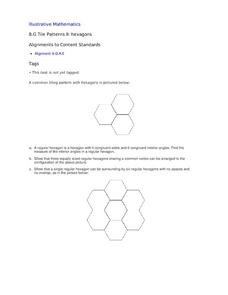

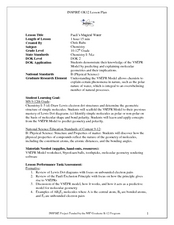



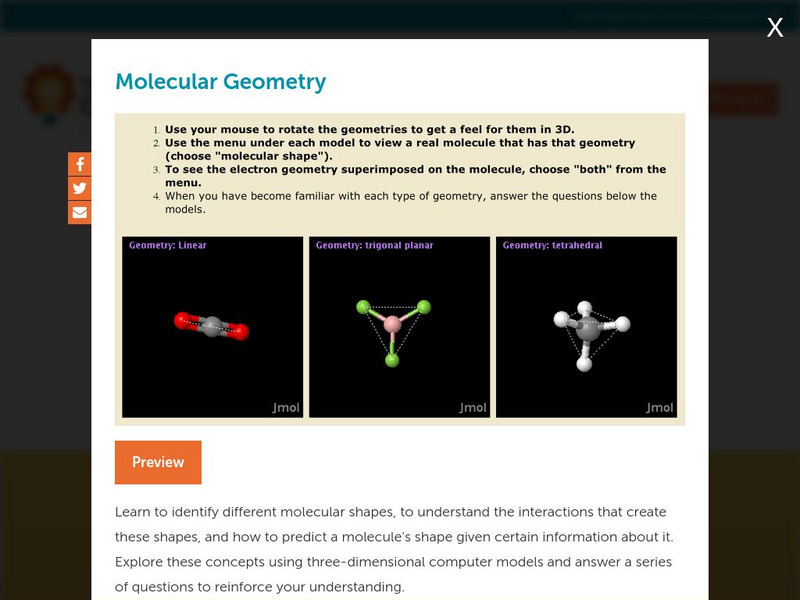
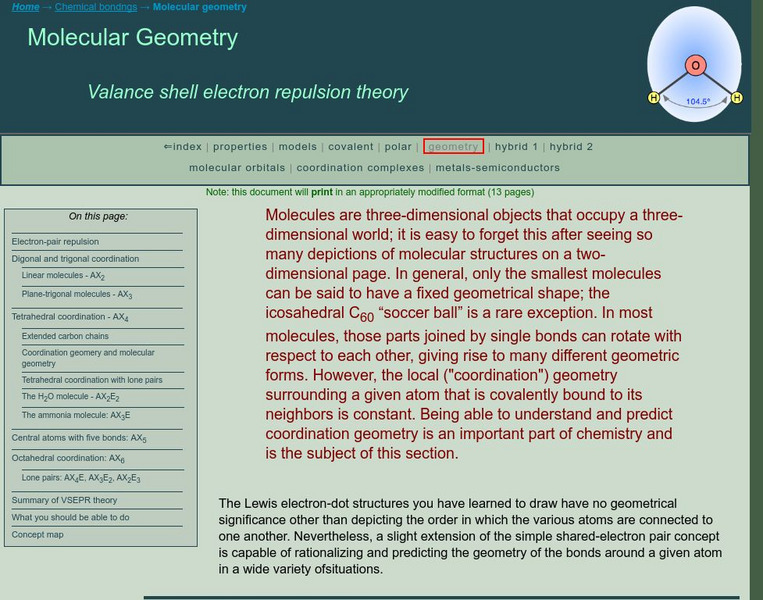
![Chiral Publishing: An Introduction to Chemistry: Molecular Structure [Pdf] eBook Chiral Publishing: An Introduction to Chemistry: Molecular Structure [Pdf] eBook](https://d15y2dacu3jp90.cloudfront.net/images/attachment_defaults/resource/large/FPO-knovation.png)



